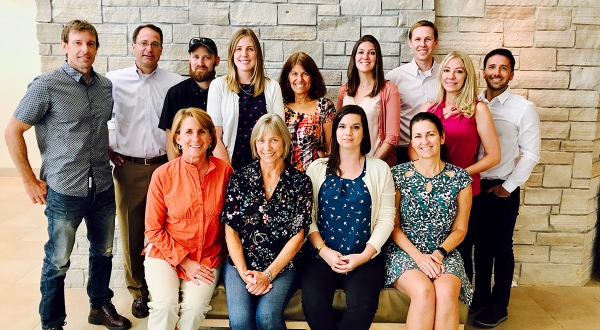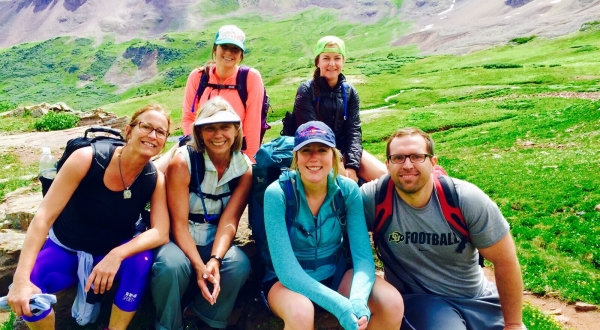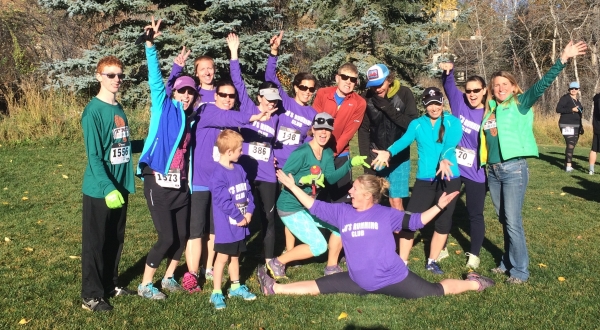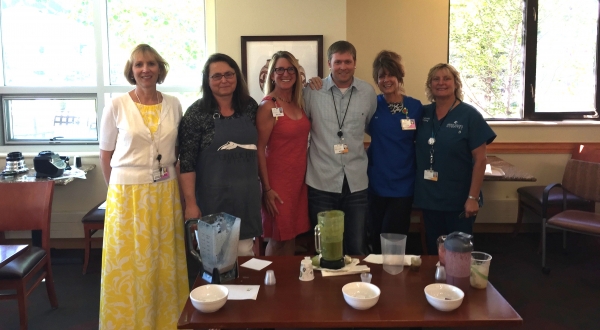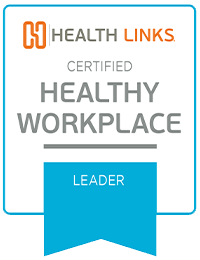
Health Links (HL): How did Health Links help Aspen Valley Hospital?
Aspen Valley Hospital (AVH): The Health Links Assessment is a great tool to benchmark where you are at and the advising sessions are helpful because it's always beneficial to have that third party take a look at your programs. It's refreshing to hear advisors pick out areas you can improve upon—areas you may have been ignoring or unaware of. I also like the resources Health Links offers, such as templates for programs and policies. It's great to have those resources at your fingertips.
HL: What does being a Healthy Business mean to your organization? How does it reflect Aspen Valley Hospital's values or business goals?
AVH: Being a Healthy Business is in line with our vision: being a leader in fostering the healthiest community in the nation. The hospital takes this vision very seriously and the wellness committee has that same vision. For me, it's providing my employees with the resources they need to lead a healthy and safe lifestyle both at home and at work. As a community hospital, we're here to serve and provide for the entire community, and this includes health both at work and at home.
HL: How does Aspen Valley Hospital create a culture of health, safety, and well-being for employees?
AVH: We create that culture in two ways. The first is through our leadership. Our CEO is the picture of wellness; he gets up at 5:00am to run, he is extremely supportive of the wellness program, and he sends out company-wide letters in support of wellness initiatives. Having this top-down support illustrates to employees the importance of our health and safety culture. The second way is through our wellness committee. The committee meets every other month across all of the departments. It's a huge brainstorm session, incorporating feedback from coworkers. It has taken some time, but there has definitely been this cultural shift and shift of expectations regarding health and well-being. Standards have changed. For example, we now offer veggie options in our café and those choosing those options has gone up 30 percent. People are making healthier choices.
HL: What changes have you seen among your employees, their families, or the surrounding community as a result of your program(s)?
AVH: It's always interesting to see how new hires react to our programs and culture. For our employees, a culture of health, safety, and well-being has become the norm. We've also recently changed our program from a points-based to an outcomes-based program and have seen a significant increase in engagement and participation. Eight out of nine doctors participate and we've seen an increase in manager participation from 68% engagement last year to 84% this year. It's a clear cultural shift about health outcomes.
HL: What does working for a healthy business mean to you personally as an employee?
AVH: It is my goal to provide every employee with the tools and resources they need to bring about behavior change. We all reap the benefits and have those successes. When people call and tell me about their successes, their small wins, those are important and that's what's cool about working for a healthy business. Everything we do is based on health, safety, and well-being.
HL: Have you seen any changes in your life and personal health as a result of Aspen Valley Hospital's focus on employee health and safety?
AVH: Oh, yes. We just partnered with a local cycling business to provide a discounted drop-in class for any AVH employee. It is outside of my realm, but the owner wanted me to try it. It helped me branch out and try something new. I think it's important to be a model of wellness for your employees. And not just a model of all things healthy—a model of balance as well. I'll still have my share of ice cream at hospital celebrations. Sometimes I forget to step away from my desk for lunch. We're all human. I try to practice balance and the programs we have in place support that effort.
HL: How does Aspen Valley Hospital engage with the community?
AVH: We do our health fairs a couple times a year and volunteer for those events. We also provide an educational lecture series. This year, we began an orthopedic lecture series, speaking free to the community. We also sponsor events within the Valley. Further, as part of our wellness program, any employee is reimbursed a set amount for race fees and rolling out this spring, each employee is provided four hours of PTO to volunteer for any organization that focuses on population health management.
HL: How do you show appreciation for your team?
AVH: We have a great employee recognition committee. One program is called Spark of the Quarter—employees can nominate other coworkers for things they've done well. The committee then reads all submissions and chooses a 'spark' of the quarter, acknowledging the employee with a lunch party. We also recognize a spark of the year and they get to be in the 4th of July parade.
Health Links (HL): Why is the health and safety of your employees important to you?
Aspen Valley Hospital (AVH): Aspen Valley Hospital is committed to being the leader in fostering our community as the healthiest in the nation. AVH values its employees and recognizes that the health and well-being of our employees contribute to our success. Resilient and well-balanced employees are better equipped to care for our patients and set an example for our community.
HL: What does your workplace health and safety program look like? Do you offer both components to employees?
AVH: AVH is proud to offer a robust wellness and safety program to its employees. Evolve is the name of our wellness program because everyone is constantly becoming a healthier version of themselves. Our program provides employees with the tools and resources to improve their health status and enhance their quality of life. Evolve implements health promotion strategies including educational seminars, health-related challenges, and an opportunity to meet one-on-one with the coaching staff to set and reach health and well-being goals. Evolve focuses on the mind, body, spirit creating a healthy work-life balance. We also have a comprehensive safety program and safety committee. AVH is Cost-Containment Certified by the State Department of Labor, and is continuously implementing strategies to prevent and control physical injury. As part of the Valley Health Alliance, Aspen Valley Hospital is now a Total Worker Health Affiliate. In May of 2016, a department-wide safety and wellness checklist was implemented to improve employee workspaces to promote the Culture of Safety and Total Worker Health Initiative. We are working on better aligning our wellness and safety programs to enhance the quality of life and safety for our employees. Ultimately these efforts will help us to provide positive patients experiences as well.
HL: How will you/do you know your program is successful?
AVH: Aspen Valley Hospital bases our wellness program success on employee surveys, the level of employee engagement and participation, and our HERO scoring reflected over the years. We measure our safety program success based on the number of our workers' compensation claims and the cost of our total claims. We compare this data over the years to measure our progress, and to help us better focus our employee education programs focused on wellness and safety. Our Executive Team sets SMART goals for our wellness and safety program during annual strategic planning so we can measure our success, and contribute to our vision of being a leader in fostering a healthy community.
HL: What obstacles did you have to overcome to get your program started? How did you overcome them?
AVH: Aspen Valley Hospital experienced a few obstacles over the years pertaining to the wellness program. In the beginning, the wellness program was looked at as “Big Brother”, and we struggled with employee participation. Over time and with lots of education about why AVH was taking certain wellness initiatives, employees accepted the change. The Evolve Wellness Program is now regarded as a normal part of our culture. Several employees have stepped up, and become wellness champions which helped the wellness program gain traction in each department.
HL: Does your health and safety program help give back to your community?
AVH: AVH encourages employees to volunteer at their preferred organization as well as offering specific volunteer opportunities with our local senior center and Habitat for Humanity. The Evolve wellness program also reimburses employees for entry fees in various community events and races. Our Emergency Management and Trauma programs offer many safety programs throughout the year including providing free helmets to locals for summer and winter sports. Additionally, the hospital holds community health fairs multiple times throughout the year. AVH is a sponsor for We-Cycle, a local bike sharing program. We have a We-Cycle station on site, donate helmets for users of the bikes, and we have partnered with We-Cycle’s Movimiento en Bici project to bring options for a healthier lifestyle to our Latino employees.
HL: What tip/advice would you give to a business that is considering starting a workplace health and safety program?
AVH: Our advice for a business that is beginning a health and safety program would be transparency, leadership buy-in, and seeking wellness champions within the organization. Educate your employees on the strategic plan, and explain why you are introducing change. Being as transparent as possible allows the employees to digest why these initiatives are taking place, and that the employer really does care about their safety and well-being. Over time, the transparency will pay off and the program will become part of the organization culture. Having leadership buy-in sets the bar for employees. If your leaders are actively participating in your wellness or safety program, they set an example for the employees, and it becomes the norm in your organization. Developing a culture of health and safety cannot be done without leadership support. Locate the wellness champions. Find employees that are passionate about wellness and safety and have them be the information sharers and voice of the program. Seek a well-rounded representation of employees from all departments to participate in the wellness or safety committee. We have found that these champions help keep the programs fresh and energized with new ideas.
